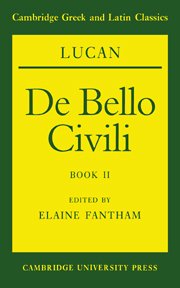Book contents
Introduction
Published online by Cambridge University Press: 05 June 2012
Summary
DE BELLO CIVILI: THE POET AND THE POEM
The De hello civili of M. Annaeus Lucanus was composed in less than six years, between the young man's recall from Athens at the invitation of the Emperor Nero, his near contemporary, in A.D. 59 and his death by his own hand on 30 March A.D. 65. All that we know about his brief career is drawn from notices in Tacitus, from Statius' Genethliacon Lucani and from two ancient lives preserved in several early manuscripts of the De hello civili, one composed by Suetonius for his set of poets' lives in the lost work De viris illustribus, the other attributed to Vacca, a grammarian of uncertain date – perhaps the sixth century. Lucan was brought up under the influence of his uncle M. Annaeus Seneca, and trained in both rhetoric and Stoic philosophy, which he studied with Annaeus Cornutus. On his return from Athens Lucan became one of Nero's official cohors amicorum and received a quaestorship ahead of his age. At Nero's new cultural festival, the Neronia of A.D. 60, the poet won public acclaim for his encomium of the Emperor (the Laudes Neronis, mentioned by Vacca 40) and was further honoured by appointment to the augurate.
But both Vacca (42–7) and Suetonius (13–22) report a subsequent quarrel with Nero, triggered by the Emperor's artistic jealousy. Like Tacitus (Ann. 15.49), they cite this quarrel and Nero's subsequent ban against Lucan performing his poetry or appearing in public as Lucan's motive for joining the conspiracy to assassinate the Emperor and to replace him with the noble senator Calpurnius Piso.
- Type
- Chapter
- Information
- Lucan: De bello civili Book II , pp. 1 - 48Publisher: Cambridge University PressPrint publication year: 1992



